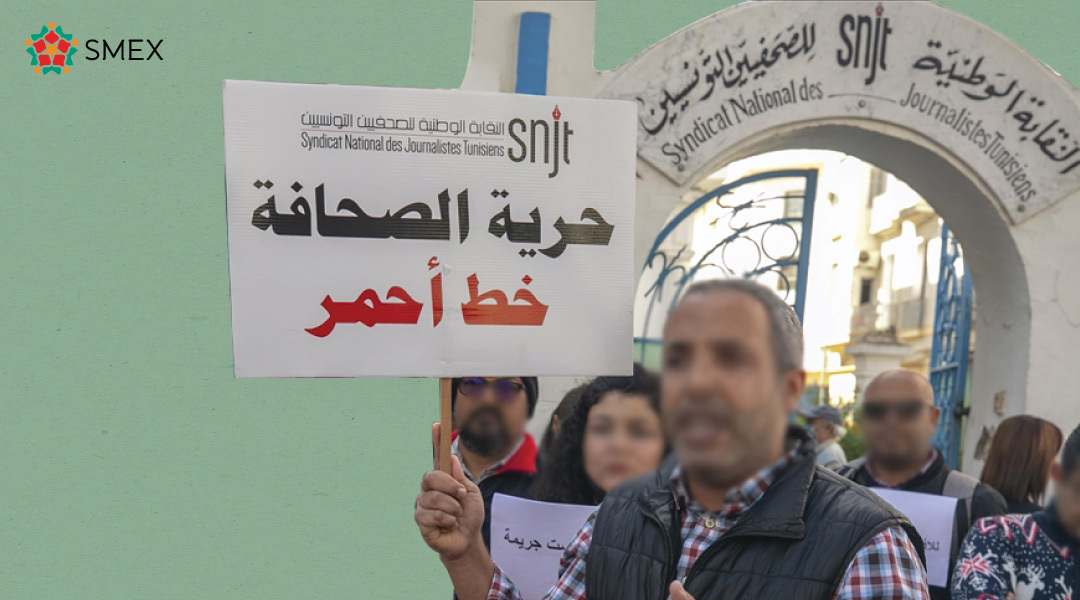Mosaïque FM’s local reporter, Khalifa Al Qasimi, was shocked to hear he was sentenced to one year in prison on November 29. Earlier, in mid-March, he was detained for one week after being served a lawsuit for refusing to reveal his journalistic sources. Qasimi was later released on probation amid concerns by local and regional professional organizations about the Tunisian government’s mounting crackdown on the freedom of the press.
Following Qasimi’s phone search, security forces identified the source of a piece he had written about a terrorist cell in the central governorate of Kairouan. The source was none other than the head of the governorate’s Anti-Terrorist Division, who had led the operation. Tunisian journalists have been facing daunting challenges in citing official sources who fear criminal or administrative penalties, as was the case with Qasimi.
The police questioned Qasimi for nine hours, demanding he reveal his source. When he refused, they threatened to press charges based on the Anti-Terrorism Law. Qasimi told SMEX: “I was arrested by the police and ordered to disclose my sources. I was promised to walk out free if I did, but I refused. As a revenge, they charged me with colluding with terrorists citing Articles 34 and 62 of the Anti-Terrorism Law.”
The police acted illegally. Article 11 of the Decree-Law on the Freedom of the Press, Printing and Publishing protects the right of journalists to keep their sources confidential, stating: “Journalists shall not be subjected to pressure of any kind by any authority or required to reveal the source of their information unless ordered to do so by the competent judge,” which did not happen in Qasimi’s case.
Furthermore, Article 37 of the Anti-Terrorism Law exempts journalists from the charge of committing a terrorist crime, which applies to anyone who “refrains from notifying concerned authorities immediately of any acts, information or instructions communicated to them related to committing a terrorist crime, regardless of professional confidentiality.” The same article stipulates that Decree-Law No. 115 on the Freedom of the Press, Printing and Publishing shall apply to press-related cases.
Qasimi told SMEX that since the lawsuit in March, he has been facing difficulties in obtaining information from official sources, who now fear punishment, and he believes that most journalists are facing the same challenge.
“These sources now fear the consequences of disclosing information,” he explained, adding that “this is not limited to security-related matters. Even officials in the Ministries of Agriculture, Health, or Education, for example, now refrain from making any statements or providing any information, fearing penalties or the disclosure of their identities.”
According to Qasimi, this is mainly due to him stating that his phone was confiscated by the police, meaning that “they have access to the phone numbers of my sources and they can also access my email.”
Now, Qasimi awaits the hearing to appeal the ruling and the travel ban imposed on him, hoping the lawsuit would be dropped, especially since the investigative judge admitted to an irregularity in the charges pressed against him, according to Qasimi’s statement to SMEX.
Judges Abuse the Law
In a talk with SMEX, legal advisor for the Violations Monitoring Unit at National Syndicate of Tunisian Journalists (SNJT), Mundhir Al Sharni, said: “Tunisian law granted journalists the right to source protection, allowing them not to disclose the identity of their sources in order to protect journalists and ensure the continuity of their sources.”
Despite these legal guarantees, “many journalists have faced pressure during preliminary interrogations (by the police) to reveal the source of their information,” explains Sharni. “However, the law clearly stipulates that such disclosure is subject to specific conditions and can only be requested by the competent judge, not the police or the investigative judge.”
Sharni criticized the conduct of judges and police officers in press-related cases. He argues that “Judges are failing to enforce Decree-Law No. 155,” adding that they ought to assume their role in protecting journalists and ensuring their right to source protection, rather than undermining this right. Moreover, since judges have the discretion to interpret provisions on national defense or security secrets, they should do so with caution, as it may lead to journalists’ protection or their implication, according to Sharni.
For instance, according to the Criminal Code, journalists may be accused of crimes that are punishable by imprisonment, such as slander. This is why the SNJT, since the enactment of Decree-Law No. 115 on the Freedom of the Press, Printing and Publishing in November 2011, has been demanding that journalists be prosecuted under said Decree-Law rather than the Criminal Code in press- and publishing-related cases.
In May 2022, Tunisia dropped by 21 points on the Reporters Without Borders (RSF) Press Freedom Index. Countries are ranked based on indicators relating to how state authorities deal with the press and media. Tunisia’s low ranking was the result of extraordinary measures taken by President Kais Saied in July 2021 and reinforced by the arrest of Qasimi.
Samir Bouaziz, the Advocacy Officer at RSF North Africa, told SMEX: “The populist approach in dealing with the Tunisian press has been growing since President Saied’s accession to power in 2019, gaining momentum after his extraordinary measures.”
“Executive authorities followed suit. They withheld information and dried up information sources, as they have failed to abide by the Constitution and the applicable laws that ensure the right to access information. At the same time, they enacted draconian laws that restrain the work of journalists.”
While Decree-Law No. 115 protects the confidentiality of sources, the problem lies in applying other punitive laws and referring individuals to military courts, according to the RSF officer.
Crackdown from the Top of the Pyramid
Signs of restricted freedom of the press first came into public view after the Tunisian President took over the legislative and executive powers and part of the judiciary in mid 2022. He had suspended parliament while granting himself far-reaching legislative powers with the issuance of Presidential Decree No. 117 in September of last year.
Earlier, Saied had declared himself head of the Public Prosecution, a key office in the Tunisian judiciary, before dealing his final blow with the enactment of Decree-Law No. 54 on Cybercrime. “This is a clear threat to the freedom of the press and expression and a restriction of access to information and official sources,” stated the SNJT.
On Human Rights Day 2021, Tunisian Prime Minister Najla Bouden issued an internal circular setting conditions for cabinet members’ media appearances, requiring them to submit their statements for prior review and approval. The circular was met with harsh criticism from the International Federation of Journalists, which demanded its repeal.
Less than four months after President Saied’s coup, his policies began to restrict journalists’ access to information and freedom of speech. Held in the absence of journalists, Saied’s press conference with his Palestinian counterpart Mahmoud Abbas drew mockery, notably from the president of the National Union of Tunisian Journalists.
Summing up the violations to the freedom of the press, SNJT’s Annual Press Freedoms Report (issued last May) criticized the inaccessibility of the Presidency and the government overall. The report states: “Most of the violations recorded throughout the year are tightly related to the extraordinary measures declared by President Kais Saied on July 25, 2021, through which he took over all the powers.” The report added that both the Presidency and the Cabinet adopt a closed-loop communication policy, positioning the Presidency as the sole source of information.
“It is a bleak picture,” says Bouaziz, “after President Saied combined all powers in his grip, ensuring a dissident-free parliament, the situation deteriorated further with legislations that threaten journalists and further impede their work.”
President Kais Saied and his administration stifled any hopes Tunisian journalists might have for legislations that promote the freedom of the press and protect their work. While SNJT is demanding the amendment of Decree-Law No. 15 due to loopholes and ambiguities in its provisions (including Article 11, which details the right to source protection, exceptions and disclosure requirements), the odds of achieving this seem slimmer than ever. Will the motto for next phase be “a bird in the hand is worth two in the bush,” or will journalists double down on their fight for freedoms?



